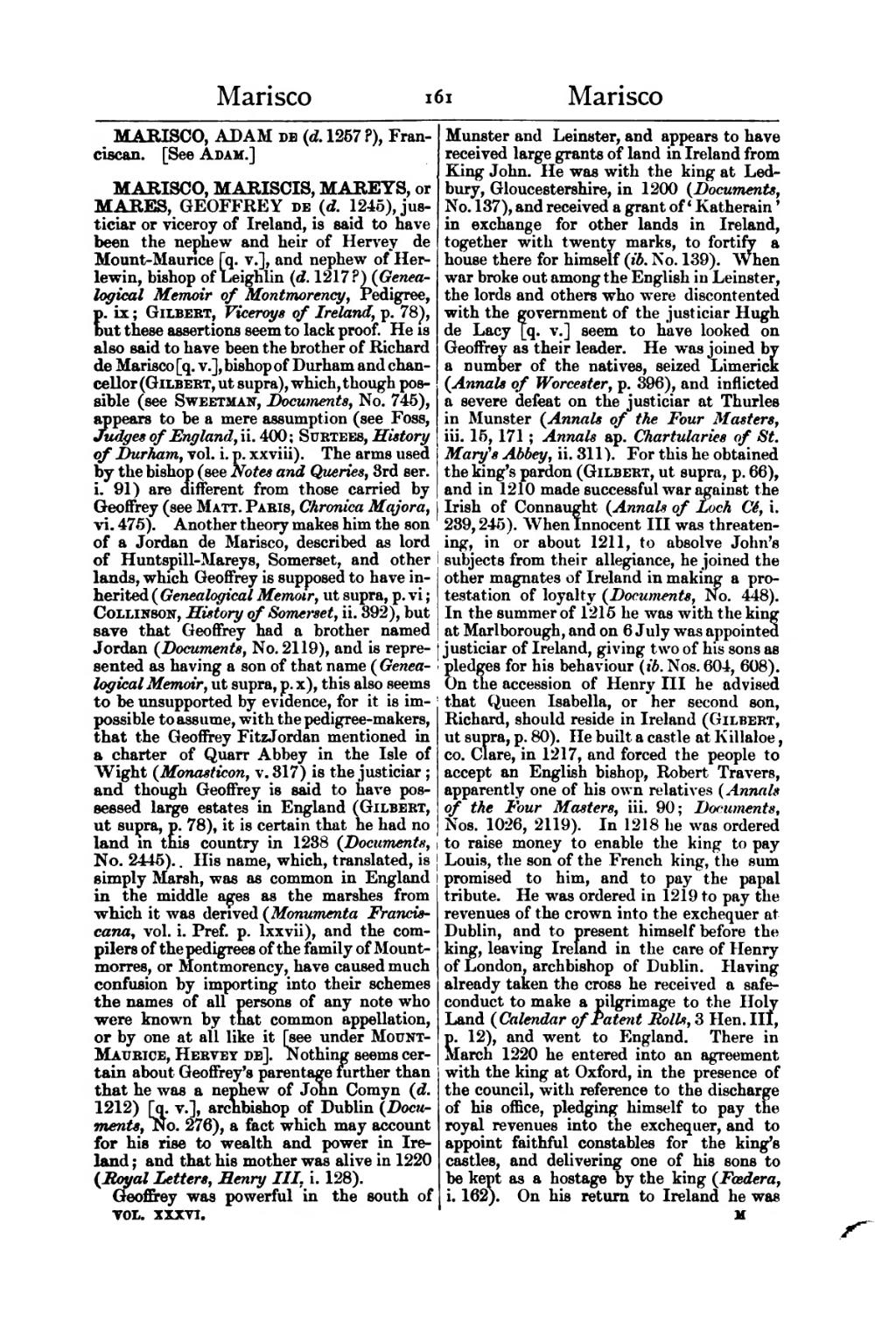MARISCO, ADAM de (d. 1257 ?), Franciscan. [See Adam.]
MARISCO, MARISCIS, MAREYS, or MARES, GEOFFREY de (d. 1245), justiciar or viceroy of Ireland, is said to have been the nephew and heir of Hervey de Mount-Maurice [q. v.], and nephew of Herlewin, bishop of Leighlin (d. 1217?) (Genealogical Memoir of Montmorency, Pedigree, d. ix ; Gilbert, Viceroys of Ireland, p. 78]), but these assertions seem to lack proof. He is also said to have been the brother of Richard de Marisco [q. v.], bishop of Durham and chancellor (Gilbert, ut supra), which, though possible (see Sweetman, Documents, No. 745), appears to be a mere assumption (see Foss, Judges of England, ii. 400; Surtees, History of Durham, vol. i. p. xxviii). The arms used by the bishop (see Notes and Queries, 3rd ser. i. 91) are different from those carried by Geoffrey (see Matt. Paris, Chronica Majora, vi. 475). Another theory makes him the son of a Jordan de Marisco, described as lord of Huntspill-Mareys, Somerset, and other lands, which Geoffrey is supposed to have in- herited (Genealogical Memoir, ut supra, p. vi ; Collinson, History of Somerset, ii. 392), but save that Geoffrey had a brother named Jordan {Documents, No. 2119), and is represented as having a son of that name (Genealogical Memoir, ut supra, p. x), this also seems to be unsupported by evidence, for it is impossible to assume, with the pedigree-makers, that the Geoffrey FitzJordan mentioned in a charter of Quarr Abbey in the Isle of Wight (Monasticon, v. 317) is the justiciar ; and though Geoffrey is said to have possessed large estates in England (Gilbert, ut supra, p. 78), it is certain that he had no land in this country in 1238 (Documents, No. 2445). . His name, which, translated, is simply Marsh, was as common in England in the middle ages as the marshes from which it was derived (Monumenta Franciscana, vol. i. Pref. p. lxxvii), and the compilers of the pedigrees of the family of Mountmorres, or Montmorency, have caused much confusion by importing into their schemes the names of all persons of any note who were known by that common appellation, or by one at all like it [see under Mount-Maurice, Hervey de]. Nothing seems certain about Geoffrey's parentage further than that he was a nephew of John Comyn (d. 1212) [q. v.], archbishop of Dublin (Documents, No. 276), a fact which may account for his rise to wealth and power in Ireland ; and that his mother was alive in 1220 (Royal Letters, Henry III, i. 128).
Geoffrey was powerful in the south of Munster and Leinster, and appears to have received large grants of land in Ireland from King John. He was with the king at Ledbury, Gloucestershire, in 1200 (Documents, No. 137), and received a grant of 'Katherain' in exchange for other lands in Ireland, together with twenty marks, to fortify a house there for himself (ib. No. 139). When war broke out among the English in Leinster, the lords and others who were discontented with the government of the justiciar Hugh de Lacy [q. v.] seem to have looked on Geoffrey as their leader. He was joined by a number of the natives, seized Limerick (Annals of Worcester, p. 396), and inflicted a severe defeat on the justiciar at Thurles in Munster (Annals of the Four Masters, iii. 15, 171 ; Annals ap. Chartularies of St. Mary's Abbey, ii. 311). For this he obtained the king's pardon (Gilbert, ut supra, p. 66), and in 1210 made successful war against the Irish of Connaught (Annals of Loch CS, i. 239, 245). When Innocent III was threatening, in or about 1211, to absolve John's subjects from their allegiance, he joined the other magnates of Ireland in making a protestation of loyalty (Documents, No. 448). In the summer of 1215 he was with the king at Marlborough, and on 6 July was appointed justiciar of Ireland, giving two of his sons as pledges for his behaviour (ib. Nos. 604, 608). On the accession of Henry III he advised that Queen Isabella, or her second son, Richard, should reside in Ireland (Gilbert, ut supra, p. 80). He built a castle at Killaloe, co. Clare, in 1217, and forced the people to accept an English bishop, Robert Travers, apparently one of his own relatives (Annals of the Four Masters, iii. 90; Documents, Nos. 1026, 2119). In 1218 he was ordered to raise money to enable the king to pay Louis, the son of the French king, the sum promised to him, and to pay the papal tribute. He was ordered in 1219 to pay the revenues of the crown into the exchequer at Dublin, and to present himself before the king, leaving Ireland in the care of Henry of London, archbishop of Dublin. Having already taken the cross he received a safe-conduct to make a pilgrimage to the Holy Land (Calendar of Patent Rolls, 3 Hen. Ill, n. 12), and went to England. There in March 1220 he entered into an agreement with the king at Oxford, in the presence of the council, with reference to the discharge of his office, pledging himself to pay the royal revenues into the exchequer, and to appoint faithful constables for the king's castles, and delivering one of his sons to be kept as a hostage by the king (Fœdera, i. 162). On his return to Ireland he was
